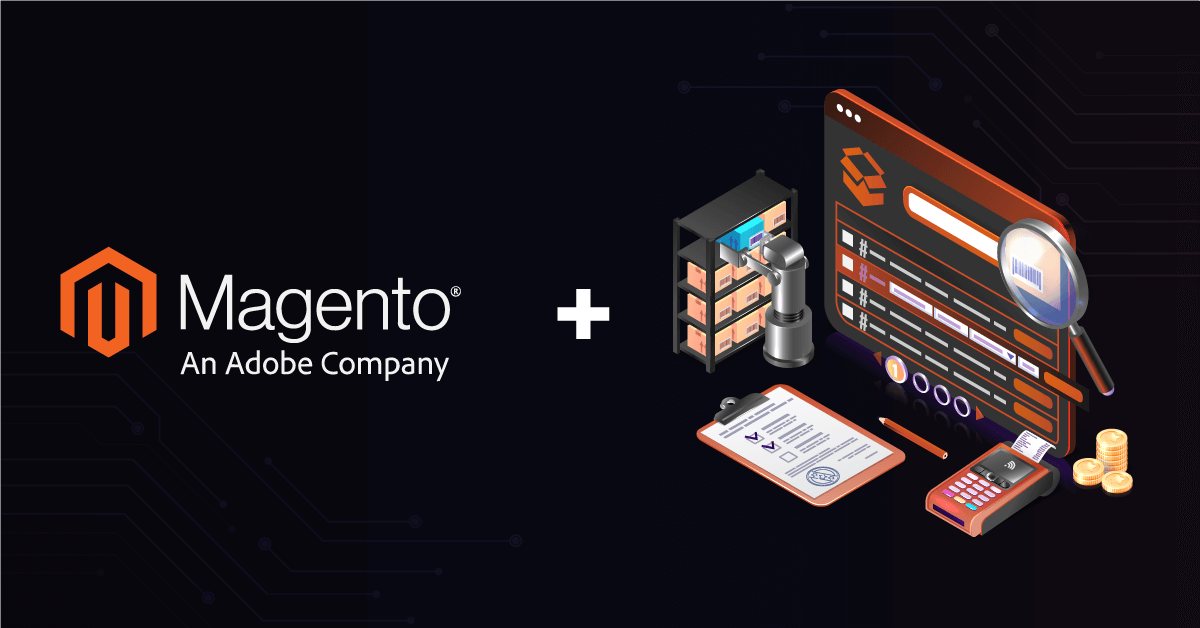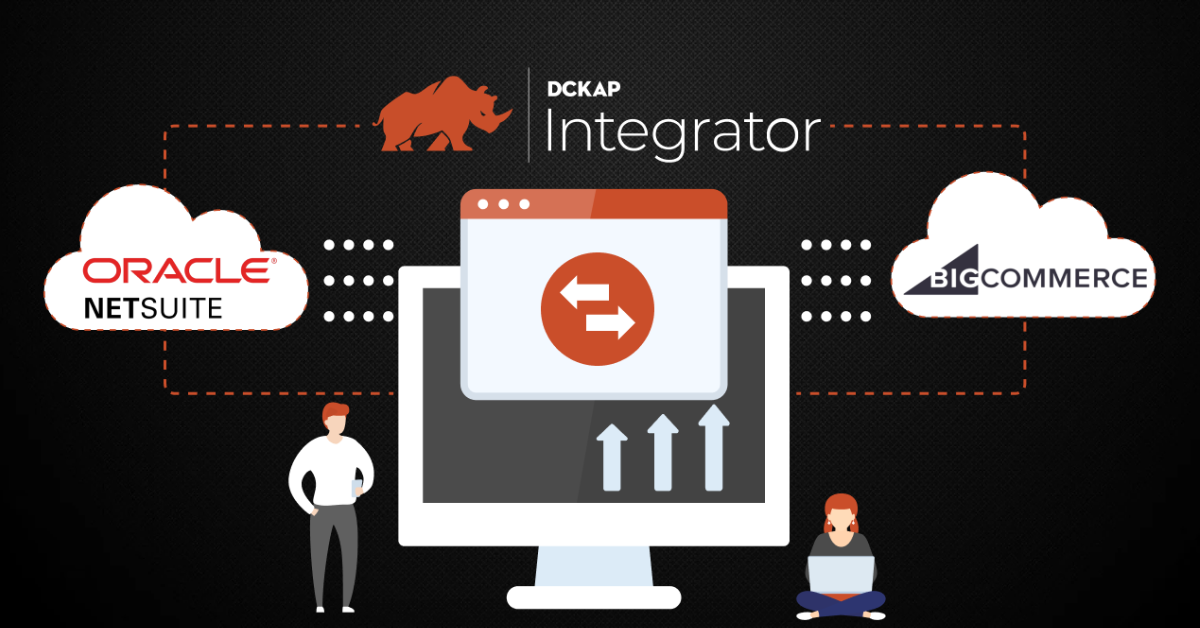Point of Sale (POS) systems act as the nerve center for all financial transactions. Historically, this was shorthand for a physical store’s cash register.
Modern point-of-sale (POS) systems, on the other hand, are highly developed pieces of software that manage finances, stock, and customer information. Business requirements vary; therefore, these systems can be deployed on-premises, in-house, or in the cloud.
Integrating these systems with your ecommerce platform such as Magento (now Adobe Commerce)* can offer many advantages. This blog covers the key methods, advantages and challenges associated with Magento – POS Integration.
Contents
Top 5 Methods for Magento POS Integration
1. API Integration
The term API integration refers to the process of establishing a connection between the Magento store and the POS system. Using this strategy, data on both online and offline platforms is kept in sync in real-time. Also learn about Magento API integration or Magento erp integration
2. Middleware Integration
To ensure that Magento and the POS system can communicate without any hitches, middleware is used to act as a go-between for the two. It converts information so that many computer systems can read and use the same data.
3. Extension Integration
Using pre-built extensions that are specifically designed for POS functionality is part of the process of integrating Magento with a POS extension. These extensions increase the capabilities of the Magento store, enabling it to communicate with the POS system successfully.
4. Custom Integration
With custom integration, a solution is created from scratch based on the specific needs of the company. It offers a highly individualized and flexible integration approach that may be tailored to your unique processes and features.
5. Hybrid Integration
Hybrid integration is a comprehensive and powerful integration system that includes different methods, such as application programming interfaces (APIs), middleware, and custom solutions. Complex businesses with a wide range of needs can benefit from this method.
Recommended read: Hybrid Integration Platform vs iPaaS Explained
Choosing the Right Magento POS System
When deciding on the best Magento POS system, it is important to take into account the specific needs of your company. The size, budget, and unique requirements of the company are just a few factors that affect the choice of a POS system.
Some crucial factors are as follows:
- Integration Capabilities: It’s crucial that the Magento POS system can easily connect to the web store. A good integration will be seamless and productive, enabling online and offline stores to sync their data in real-time.
- Compatibility with Hardware: The system’s support for POS terminals, cash drawers, and barcode scanners should be taken into consideration. Easy installation requires compatibility with already-existing hardware or the availability of compatible gear on the market.
- Scalability: Pick out a Magento POS system that can expand with your company. With scalability, you know your system can take on more business without slowing down or losing data about your customers or your inventory.
- Security Features: When dealing with credit card and debit card transactions, security is of the utmost importance. Make sure the POS system you choose has strong security measures in place to keep your customers’ personal information and financial data safe.
- Customer Support and Training: To get the most out of your Magento POS system, choose a vendor that puts its customers first and provides comprehensive support and training. Quick problem resolution requires accessible customer support, and competent system utilization necessitates well-rounded training for all employees.
- Cost-Effectiveness: Think about the Magento POS system’s pricing structure. Consider the full price of ownership, which may include one-time payments, recurring membership fees, and additional charges for features like extensions and personalization.
Pick a solution that fits within your company’s price range while also providing adequate functionality.
Essential Features of Magento POS Integration
Cloud-Based POS Systems
An advantage of a cloud-based POS system is its adaptability and convenience. They make it possible for businesses to handle financial transactions, inventory, and customer information from any location with an Internet connection.
The cloud-based method guarantees scalability, so it can accommodate businesses of any size.
Barcode Scanners and Readers
A Magento POS system cannot function without barcode scanners and readers. By reading product barcodes quickly, obtaining data, and updating inventory levels properly, they speed up the checkout process.
Email Receipts and Customer Communication
The ability to email receipts to clients via a Magento POS integration helps businesses save paper while also making it a convenient way for customers to keep tabs on their spending.
To further increase customer involvement, businesses can use customer email addresses to send out news, specials, and tailored offers.
Integration with Magento Extensions
The functionality of the Magento platform can be expanded using a variety of extensions. Point-of-sale (POS) extensions work flawlessly with Magento, expanding the platform with capabilities like loyalty programs, discounts, and in-depth reporting.
Customization and scalability are made possible by these extensions, which are tailored to individual company needs.
Integration with Mobile Devices
Businesses can offer effective customer service thanks to mobile POS devices and POS applications. The shopping experience is improved when salespeople can help consumers complete transactions and obtain product information while on the move.
User-Friendly Interface
Both employees and customers benefit from a user-friendly interface. Customers may browse products and make purchases with ease because of the website’s intuitive design and simple navigation, which allows sales agents to handle transactions swiftly.
Importance of Magento POS Integration
Magento, one of the most popular e-commerce platforms, provides powerful tools for online businesses. It unifies the in-store and online shopping experiences by easily integrating with POS systems.
Here’s why integrating Magento with a POS system is so important for businesses today.
Streamlining Operations
Businesses may effectively manage their inventory using real-time inventory synchronization between online stores and physical store locations. This connection guarantees that all product data (name, price, and availability) is accurate and consistent across all channels.
Errors are cut down on, stock-outs are avoided, and customer satisfaction is boosted as a result of this synchronization.
Enhancing Customer Experience
Whether a customer interacts with a company via a web browser or a mobile device, responsive design makes sure that they have a consistent buying experience. The ability to pay however the customer prefers, along with an omnichannel sale system, makes shopping a breeze.
Empowering Sales Agents
Sales agents can easily access product information thanks to a Magento POS system, which provides necessary equipment like barcode scanners. Sales agents can improve the buying experience by tailoring their suggestions to individual customers, thanks to easy access to customer data.
Secure Payment Processing
The incorporation of several payment options, such as credit cards, debit cards, and more guarantees secure transaction processing. Customers will feel more comfortable moving forward with their transactions thanks to this functionality.
Efficient Sales Tracking
The POS integration with Magento yields rich statistics for any business. Business owners and managers can track sales trends, best-sellers, and customer behavior.
A data-driven strategy can help businesses improve their marketing, product development, and decision-making.
Seamless Online and Offline Experience
Businesses may build a seamless experience between online stores’ checkout pages and physical stores’ cashier counters by connecting Magento with a POS system.
Having the option to begin a purchase online and finish it in-store, or vice versa, is a huge time saver for customers.
Challenges in Magento POS Integration
Store owners are increasingly using Magento POS integration to connect their physical and online stores as the market changes. Integration is not without problems.
Store owners must handle their businesses’ and customers’ unique needs when connecting Magento stores with point-of-sale (POS) systems.
1. The complexity of Managing Orders
Order management is a major issue for Magento POS store owners. Orders must flow smoothly across online and offline channels to ensure proper inventory levels and timely fulfillment.
Synchronizing these orders in real-time while serving online and in-store users takes careful planning and a powerful POS system.
2. Magento Store Diversification
Store owners run various outlets, including mortar stores, retail stores, and online stores. Each store type has different needs and customer expectations.
Bringing all these stores under a single Magento POS requires a customized method to meet each store’s environment while keeping product and pricing uniform.
3. Data Integration Challenges
Integrating Magento stores with POS systems like Magestore POS and Ebizmarts POS requires handling massive sales data. This data includes transactions, customers, products, and inventory.
Synchronizing without compromising data integrity is difficult. Inconsistencies can lead to bad company decisions and unhappy customers.
4. Meeting Customer Expectations
Modern customers have various demands and expectations. Store owners must cater to potential customers, whether they prefer in-store or online shopping.
A seamless point-of-sale system that unifies online and offline buying is essential. Maintaining operational efficiency while satisfying both sorts of customers is difficult.
4. Streamlining Payment Processes
The payment process is crucial for customers. Integrating Magento stores with the Magento 2 POS extension and other POS systems demands careful consideration of secure and efficient payment methods.
Smooth online and in-store transactions require a robust connection that can manage several payment processes while protecting sensitive customer data.
5. Overcoming Inventory Management Challenges
Successful operations depend on inventory management. Warehouses and inventory systems must be updated in real-time with Magento stores.
Store owners must monitor stock, product availability, and demand across different locations. Failure to do so can cause stockouts, overstocking, and unhappy customers.
6. Addressing the Omnichannel Dilemma
Omnichannel sales systems aim to streamline shopping across all channels. Online and physical store checkout pages and cashier counters are difficult to integrate.
Store owners need solutions that let customers shop online and finish in-store, building brand loyalty through convenience.
7. Collaboration with Development Teams
Development teams with Magento and POS expertise commonly work on integration. Store owners and development teams must communicate.
The development team must clearly state business needs and goals to integrate successfully. Suboptimal solutions and implementation delays might result from miscommunication.
8. Providing a Convenient Checkout Experience
A simple checkout process is key to customer satisfaction. A user-friendly interface is needed to integrate barcode readers, web-based POS, and other POS solutions and save checkout time. Checkout delays or errors can cause abandoned carts and missed sales.
DCKAP Integrator: Seamless Magento POS Integration iPaaS
The key to success in the competitive world of online ecommerce is seamless connectivity between Magento stores and point-of-sale (POS) systems.
DCKAP Integrator delivers a faultless purchasing experience for customers and boosts store owners’ operational efficiency by accommodating online businesses.
The DCKAP Integrator reduces sales managers’ difficult activities so they can focus on strategy. This solution interfaces with the Magento site and processes product transactions quickly and accurately, with additional features including a responsive barcode reader.
Store owners may easily handle purchase orders, eliminating errors and improving productivity. The DCKAP Integrator optimizes online presence by making e-commerce store checkout pages look like physical stores’ cashier counters.
Conclusion
For businesses that want to give their customers a streamlined shopping experience, Magento POS integration is a game-changer. Businesses may streamline operations, improve customer relations, and boost sales by bridging the gap between online stores and offline stores using Magento POS solutions.
Businesses may make data-driven decisions, increase productivity, and remain competitive in the retail industry if they have access to real-time transaction, inventory, and customer data management.
Businesses that use store POS integration become market leaders as technology and customer demands change. With the correct product POS system in place, businesses can easily traverse the digital landscape and provide their customers with top-notch products and services, both online and offline.




